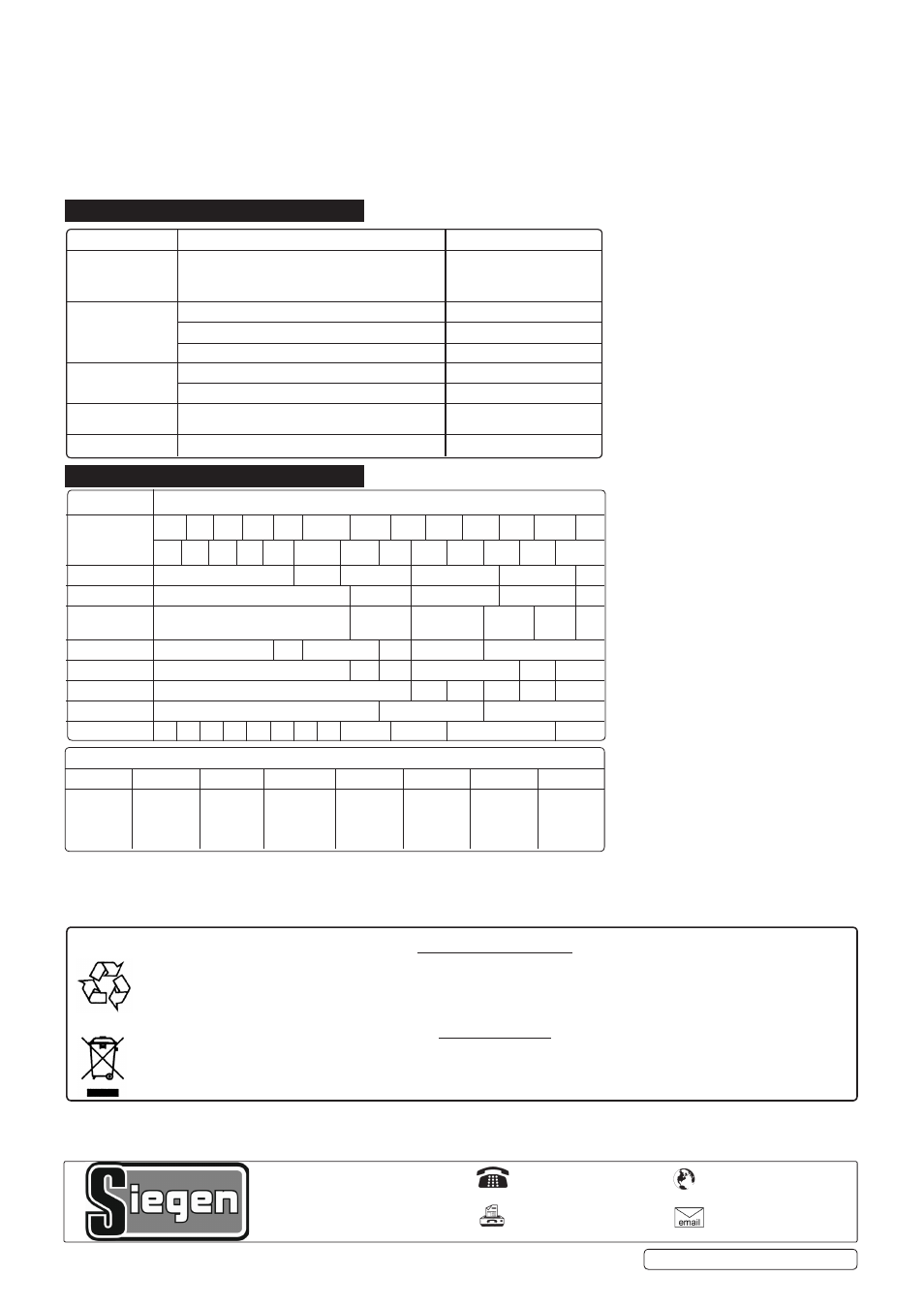Troubleshooting 7. shade guide, Welding process – Sealey S01001 User Manual
Page 3

NOTE: It is our policy to continually improve products and as such we reserve the right to alter data, specifications and component parts without prior notice.
IMPORTANT: No liability is accepted for incorrect use of this product.
WARRANTY: Guarantee is 12 months from purchase date, proof of which will be required for any claim.
Sole UK Distributor, Sealey Group.
Kempson Way, Suffolk Business Park,
Bury St. Edmunds, Suffolk.
IP32 7AR
www.sealey.co.uk
01284 757500
01284 703534
Web
5.2. REPLACING OUTER PROTECTIVE COVER LENS
5.2.1. Remove the shade cartridge (refer to 5.1)
5.2.2. Push the lens into the helmet and renew.
5.3. REPLACING INNER PROTECTIVE COVER LENS.
5.3.1. From inside the helmet, use finger recess in the top edge of the filter to lever up the lens and replace.
5.4. CLEANING
5.4.1. Clean helmet by wiping with a soft cloth. Clean cartridge surfaces regularly. Do not use solvent based cleaners .
5.4.2. Clean sensors and solar cells with methylated spirit using a clean cloth and wipe dry with a lint-free cloth.
6. TROUBLESHOOTING
7. SHADE GUIDE
Problem
Cause
Solution
Irregular darkening or
dimming.
The headband may have been unevenly set on the two
sides of the helmet (unequal distances from the eyes to
the shade cartridge).
Readjust the distance of the
shade cartridge.
Shade cartridge does
not darken or flickers.
The sensors are soiled or obstructed.
Clean.
Front cover lens oiled or damaged.
Clean or replace.
Welding current too low.
Adjust weld amps.
Poor vision.
Operative lenses and/or shade cartridge soiled.
Check, clean or replace.
Insufficient background lighting.
Adjust light.
Slow response.
Operating temperature too low.
Do not use at temperatures
below -10oC (14oF).
Welding helmet slips.
Headband adjustments incorrect.
Refer to section 4.
Problem
Cause
Solution
Irregular darkening or
dimming.
The headband may have been unevenly set on the two
sides of the helmet (unequal distances from the eyes to
the shade cartridge).
Readjust the distance of the
shade cartridge.
Shade cartridge does
not darken or flickers.
The sensors are soiled or obstructed.
Clean.
Front cover lens oiled or damaged.
Clean or replace.
Welding current too low.
Adjust weld amps.
Poor vision.
Operative lenses and/or shade cartridge soiled.
Check, clean or replace.
Insufficient background lighting.
Adjust light.
Slow response.
Operating temperature too low.
Do not use at temperatures
below -10oC (14oF).
Welding helmet slips.
Headband adjustments incorrect.
Refer to section 4.
CURRENT (AMPERES)
WELDING
PROCESS
0.5 2.5 10
20
40
60
125
175
225
275
350
450
1.0 5.0 15
30
50
100
150 200
250
300
400
500
Covered Electrode
Shade 9
S10
Shade 11
Shade 12
Shade 13 S14
MIG Plate Welding
Shade 10
Shade 11
Shade 12
Shade 13 S14
MIG Sheet
Welding
Shade 10
Shade 11
Shade 12
S13
S14
S15
TIG
Shade 9 S10
Shade 11 S12
Shade 13
Shade 14
MAG
Shade 10 S11
S12
Shade 13
S14
S15
Arc Gouging
Shade 10
S11
S12
S13
S14
S15
Plasma Cutting
Shade 11
Shade 12
Shade 13
Plasma Welding
4
5
6
7
8
9 10 11
S12
Shade 13
Shade 14
S15
Meaning of the markings on the filter:
4
9
13
SEALEY
1
3
1
379
Light state
scale no.
Lightest dark
state scale
no.
Darkest
state scale
no.
Manufacturers
identification.
Optical class. Diffusion of
light class.
Variation in
luminence
transmittance
class.
Number of
the applied
standard.
Environmental Protection
Recycle unwanted materials instead of disposing of them as waste. All tools, accessories and packaging should be
sorted, taken to a recycling centre and disposed of in a manner which is compatible with the environment.
When the product becomes completely unserviceable and requires disposal, drain off any fluids (if applicable)
into approved containers and dispose of the product and the fluids according to local regulations.
WEEE Regulations
Dispose of this product at the end of its working life in compliance with the EU Directive on
Waste Electrical and Electronic Equipment (WEEE). When the product is no longer required, it must be disposed
of in an environmentally protective way. Contact your local solid waste authority for recycling information.
S01001.V2 | Issue 1 23/03/15
Original Language Version
© Jack Sealey Limited
